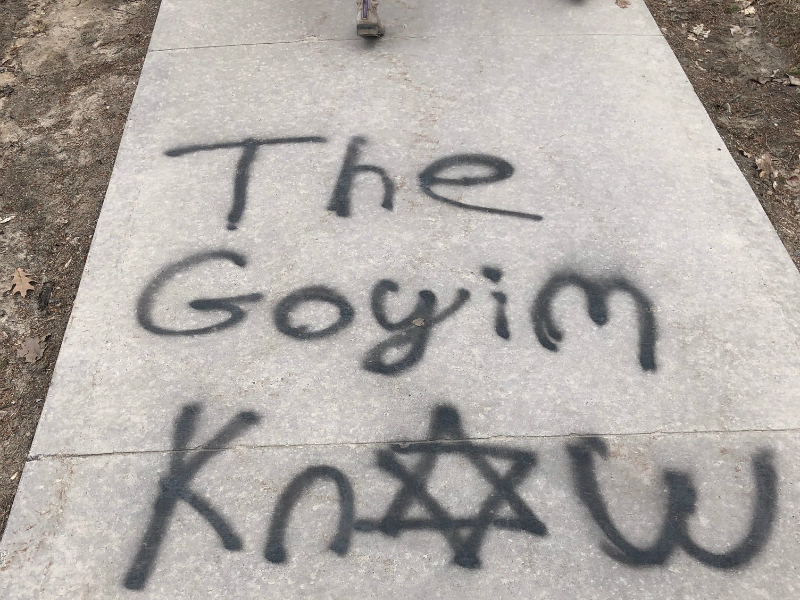It’s no secret that Jews are the single most targeted religious group when it comes to hate crimes, but the chief executive officer of the Centre for Israel and Jewish Affairs (CIJA) believes manifestations of anti-Semitism are becoming more brazen and shameless. They’ve moved out of the shadows and into the open.
In recent weeks, pro-Israel speakers at York University were intimidated by a mob, a student at McGill University who simply wanted to travel to Israel was singled out and censured, and a University of Toronto student union leader landed in hot water for suggesting a drive to get more kosher food on campus would fail because it was being led by a pro-Israel group.
And south of the border, Congresswoman Ilhan Omar’s repeated use of anti-Semtic tropes, and her party’s tepid response, have many worrying that anti-Semitism is becoming more tolerated.
All that has Shimon Fogel worried, and as CEO of CIJA, he is in a position to do something about it.
CIJA recently launched its Maspik campaign, an invitation to community groups, individuals and other organizations “to join a broad alliance of Jewish and non-Jewish groups,” to say enough (maspik) to anti-Semitism.
CIJA, in co-operation with the Jewish federations under whose auspices it operates, has launched a campaign to solicit ideas for programs and activities that will address anti-Semitism, along with requests for donors in Canada and the United States to subsidize them.
CIJA is now configuring an online application process in which organizations will be able to apply for grants for financial support for innovative programs intended to address anti-Semitism.
These could range from block parties or subsidized Shabbat dinners – both aimed at “demystifying” Jews to those who may never have met one – to larger education programs.
CIJA will be involved in arranging logistics and administering the process, but it is up to each organization to develop its own programs, Fogel said.
When the money is ready to be disbursed, likely beginning in early 2020, participants will be able to apply for “micro grants” of up to $5,000, larger ones in the $5,000-$20,000 range and even bigger ones of up to $50,000.
Some of the funding for the program will come from this year’s Negev Dinner in Toronto, which honoured Wendy Eisen and Carole Zucker.
While the funds from the Negev Dinner are welcome, it can be considered seed money towards a larger endeavour. To make the project effective, Fogel estimates that Maspik will need to raise up to $2 million each year over a four-year period.
For Fogel, a key event that especially worried him and indicated the extent to which anti-Semitism was entering mainstream politics was when Omar repeatedly employed anti-Semitic stereotypes in a way that shocked many American Jews.
For Fogel, that was bad enough, but “one of the more impactful developments didn’t have to do with Ilhan Omar, but the way in which her party responded to her. I view that as a watershed incident.”
Fogel believes that House Speaker Nancy Pelosi’s tepid response to Omar’s comments demonstrated that “we’re faced with a different type of anti-Semitism that moved from the margins and the shadows to unapologetic expressions by people with antipathy for Jews.…
“Maspik flowed from a series of conversations by people seized with the issue who wanted a common strategy.”
Eisen – the Negev Dinner honouree – was part of those conversations. She had been a prominent advocate for Soviet Jewry back in the day, said Fogel, who suggested that a similar type of community activism is needed today to address contemporary Jewry’s most pressing problem.
Looking back at the Soviet Jewry movement, Fogel said “there was a sense of unity that allowed us to overcome any obstacle.”
So far, CIJA has reached out to dozens of Jewish organizations and has received support from groups like Hillel Ontario, the National Council of Jewish Women and StandWithUs, among others, he said.
“We’ve had an amazing response,” he added.
Interest has also been expressed from the Toronto District School Board and the British Columbia Cultural Diversity Association.
He’s hopeful there could be support from outside Canada and he foresees that this sort of community mobilization could serve as a model internationally.
“The message is resonating,” Fogel said. “What’s transformative is that by relinquishing exclusive ownership of it, we’re able to liberate ourselves from those constraints and put the agenda ahead of parochial concerns.…
“If we can translate this vision into a reality where it makes a difference in the fight against anti-Semitism and it serves to unify the community and gains traction internationally, that would represent the most meaningful thing in my lifetime.”
